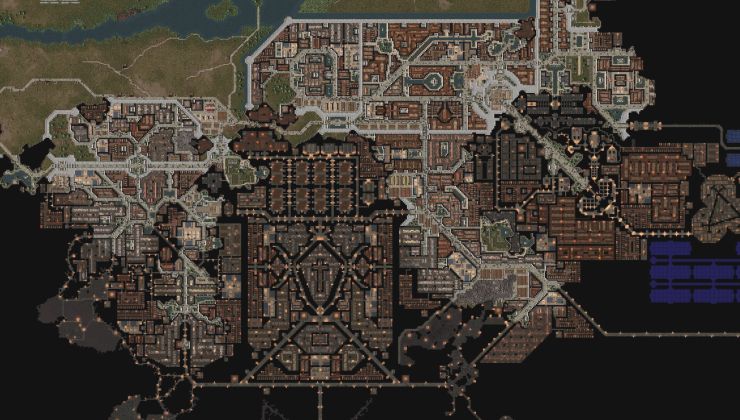Paradox Interactive are gearing up ready for the next major update to their space strategy game Stellaris. A new opt-in Beta is available for the 3.3 Unity update.
There's still plenty of work to be done to finish the update with it still in active development, however this is your time to get in early and see what's new and report any issues. Currently some new localization strings are only in English and there's some placeholders but there's a lot of new features and reworks.
Here's a breakdown of the major changes:
- All means of increasing Administrative Capacity have been removed. While there are ways to reduce the Empire Sprawl generated by various sources, empires will no longer be able to completely mitigate sprawl penalties. Penalties and sprawl generation values have been significantly modified.
- The Edicts Cap system has been removed. Toggled Edicts will have monthly Unity Upkeep which is modified by Empire Sprawl. Each empire has an Edicts Fund which subsidizes Edict Upkeep, reducing the amount you have to pay each month to maintain them.
- Unity Ambitions and Campaigns now function like Toggled Edicts and last until cancelled with upkeep rather than costs. Known Issue: Sacrifice Edicts do not show their up-front costs. Or charge them, other than the actual sacrifices, so these two cancel each other out.
- Several other systems that used to cost Influence are now paid in Unity.
- Reforming government now costs Unity. The cost is based on Empire Size.
- Resettling pops that previously cost Influence now costs Unity. Abandoning colonies still costs Influence.
- Suppressing or Promoting factions no longer costs Influence. Known Issue: Unity costs for Faction Manipulation are not yet functioning.
- Most Megastructures now cost Unity rather than Influence, with the exception of any related to travel (such as Gateways) or that provide living space (such as Habitats and Ring Worlds).
- Since Factions are no longer producing Influence, a small amount of Influence is now generated by your fleet, based on Power Projection - a comparison of your fleet size and Empire Sprawl.
- Leaders now cost Unity to hire rather than Energy, and have Unity upkeep.
- Planetary Ascension Tiers have been added to the game. After acquiring three Ascension Perks, Unity can be spent to improve the effects generated by a planet’s Designation by 25%. Costs increase with Empire Sprawl and the number of times you have performed this action. As you acquire more Ascension Perks, the maximum Ascension Tier increases, with an extra maximum bonus once all Ascension Perks have been unlocked.
To access it you need to opt into the "stellaris_test" branch, found right at the bottom of the Betas list when you go to the Properties of Stellaris on Steam.
Also, starting Monday - January 31 they're doing another Dev Clash series:

Direct Link
You can buy Stellaris from GOG, Humble Store and Steam.
Only time will tell...
All means of increasing Administrative Capacity have been removed. While there are ways to reduce the Empire Sprawl generated by various sources, empires will no longer be able to completely mitigate sprawl penalties. Penalties and sprawl generation values have been significantly modified.What?! Dammit!
This sucks. Guess the "Wanna go tall" agitators got their way this time around. No doubt somewhere around 3.6 Wide proponents will get something that makes wide viable again. And back and forth.
All this kind of tall vs. wide stuff should be options, toggles or sliders, so the tall mongers can go do their thing after flipping the switches they want and let the rest of us actually do all four Xes in a 4X game.
The Edicts Cap system has been removed.I could never figure out what that did anyway--nothing ever stopped me from issuing all the edicts I could afford and was interested in doing.
Toggled Edicts will have monthly Unity Upkeep which is modified by Empire Sprawl.Uhhhhmmmm . . . I'm not stoked about that. Bad enough I have to pay Influence for most of them when I've got star systems to grab.
. . . Looks over the rest of it . . . So, lots of stuff costs Unity instead of Influence, lots of stuff costs monthly Unity . . . but you can't boost Admin Cap . . . guess I'm going to be building a lot of Unity-making buildings instead of administrative buildings. I mean, it sounds rather annoying and kind of pointless, but I suppose it won't be that big an adjustment really. I'll just have Cultural worlds instead of Administrative worlds. Except I'll be constantly annoyed at the increase in Sprawl if I want a decent sized empire.
All in all, I think I'll probably be sticking to previous versions--I REALLY hate the idea of not being able to do anything about Sprawl.
Last edited by Purple Library Guy on 20 Jan 2022 at 5:30 pm UTC
That's the first time they actually do something for the (fabled) vertical gameplay.
Planetary ascension tiers finally try to capture those mechanics that in history allowed numerically small communities to be stronger than larger ones.
All in all, I think I'll probably be sticking to previous versions--I REALLY hate the idea of not being able to do anything about Sprawl.Just to point out, the first bit you quoted says there are ways to reduce Sprawl (just not totally mitigate its penalties).
I'm split between thinking this is strange because it feels like a balance patch for a single player game, and thinking it's strange to dramatically reshuffle the mechanics five years after release.Single player? This feels to me primarily like a multiplayer anti-snowballing balance patch—getting bigger is now no longer the single, degenerate, strategy for competition. (Well, in theory anyway, we'll see how it goes in practice.)
Uhm. Interesting.In history, as far as I can make out numerically small communities were only stronger than large ones if they had a tech advantage.
That's the first time they actually do something for the (fabled) vertical gameplay.
Planetary ascension tiers finally try to capture those mechanics that in history allowed numerically small communities to be stronger than larger ones.
Uhm. Interesting.
That's the first time they actually do something for the (fabled) vertical gameplay.
Planetary ascension tiers finally try to capture those mechanics that in history allowed numerically small communities to be stronger than larger ones.
In history, as far as I can make out numerically small communities were only stronger than large ones if they had a tech advantage.
Tech advantage is more of a consequence of a more efficient society, rather than the cause. After all real world research doesn't grow on land tiles for pop lucky enough to settle nearby to gather. Even today, inside the same nation, you might find areas where it's "easier" to make art, produce something or make reseach. That's not because of better tech, but because of the local culture (sub culture in the case of different areas in the same nation). Which produce, among other things, better tech.
Move the same person from one cultural area to another, and that average person will produce % more or less on average. That's how countries with smaller pops can topple countries with much more pops. Their society multiplier compensate the demography. And moving "tech" will certainly give a boost. As can money, weapons or resources. But only temporarily: the disparity in production overtime enlarges the gap again.
Anyway I read on reddit that the first impression on the beta is that those ascension bonuses are negligible, so I guess PDX is far from enabling actual vertical gameplays (it's not just countries, also game companies have hard time in ascending their culture
I tend to disagree. Material conditions are more likely to shape both culture and available technique. Have you read "Guns, Germs and Steel"?Uhm. Interesting.
That's the first time they actually do something for the (fabled) vertical gameplay.
Planetary ascension tiers finally try to capture those mechanics that in history allowed numerically small communities to be stronger than larger ones.
In history, as far as I can make out numerically small communities were only stronger than large ones if they had a tech advantage.
Tech advantage is more of a consequence of a more efficient society, rather than the cause.
One of the biggest things that made the hugest difference to development of societies was domesticability of plants and animals. You would think that no matter where they happened to be, humans would just domesticate whatever was handy, but there are actually some pretty specific characteristics that are needed for it to work, and they're surprisingly rare. So for instance, one might imagine that in Africa they could domesticate, say, zebras to serve like horses did elsewhere. Unfortunately, it basically cannot be done--zebras are not just horses with stripeys, and their instincts do not lend themselves at all to domestication. People have tried, it don't work.
Most of the cereal crops harvested around the world today all have their origins in a fairly restricted part of the Middle East and spread from there. The rest of the world just didn't have anything as good and easy to cultivate. And, like plants in general and to some extent animals, they spread better East-West (ie within climatic bands) than North-South, which meant they got to Europe and Asia much easier than to Africa. The Americas, being basically spread more north-south, generally found it harder to diffuse agricultural techniques from place to place than Eurasia, with its wide east-west span. Other places did come up with stuff, but it was harder and didn't work as well and so got going slower.
I won't say culture has no impact. Hard to tease out, though, and groups on top would always rather conclude that it's because of their superior culture than because of lucky material circumstances. I tend not to trust such cultural explanations.
The problem with using culture as an explanatory variable is that it's very difficult to test. First deciding what is and is not culture is difficult, then being able to break a particular culture into its constituent parts in order to make meaningful scientific tests of their causal influence is difficult. This means that saying something is due to culture is close to unfalsifiable. There's some good work on this but it's still very early (take a look at Nathan Nunn from Harvard). As such we should hesitate to attribute anything to culture until better tests are available.
Acemoglu is the world's greatest political economist (among other things).Heh. Well, if he has an ideology different from mine, he can't be the world's greatest!
The Guns, Germs and Steel geographic interpretation is not a hill I'm gonna die on, although I'd want to see the actual arguments for what's wrong with it. Certainly I've seen some more specific things Diamond was seriously wrong about. And I'm definitely seeing many modern Western institutions becoming dysfunctional in ways they weren't so much 50 years ago, and making the society work poorly, so I'm not going to claim there's no such thing as a cultural or institutional factor.
But it's all very vague at best. Western Europe suddenly became the big enchilada a few hundred years ago; does that mean Western European institutions were the best? Well . . . except Western Europe was a cultural and technological backwater for hundreds of years before that; does that mean Western European institutions were the worst? Somebody flipped a switch somewhere in the 1400s or so and Europe went from having an ineffective culture and lousy institutions to suddenly having really good ones? Colonizing the heck out of various places was all about institutional superiority and had nothing to do with having developed one or two particular technologies, such as gunpowder?
And it's going to be a massive pain teasing out the reality, in part because of human psychology. I'm thinking of the experiment these guys ran with Monopoly, where they would have two people play and they'd give one guy three times as much money to start, give them extra money when they passed Go, and let them roll three dice while the other guy rolled one. Obviously, the one with the advantage would win. But two things showed up: First, the one with the advantage would become more aggressive, ruder, change their body language to take up more space and such. Second, they would generally tell themselves that they won because of skill, superior play, not because they were given an advantage. Even though objectively, that was obviously rubbish. So I don't have a ton of expectations of objectivity from scholars figuring out the cultural factors that lead to victory. It'll be "The Mismeasure of Man" all over again, except at a cultural rather than individual level.
Last edited by Purple Library Guy on 3 Feb 2022 at 8:37 am UTC
My sole point was that, for any reason which might be whatever you like (resources, climate, superior race, grace of God, alien uplifting, WHATEVER), we can agree that at a certain point a society "grows" and becomes "better" and its members start to make more with less jsut because they are part of it. It's not a starting condition, it's a consequence of something else (in Stellaris that would be excess influence I guess). But it sticks to societies and it adds up.
I was just happy Pdx timidly tried to add some of that in the game, since I believe that is key to allow vertical gaming. All I see from them is until now is wide gameplay, only that they try to replace "land" (or space in this case) with pops. And imho that's boring. When not just silly. The (only) optimal way to game now, due to severe pop growth limitations, is essentially finding an effective way to steal population. Even cause disasters in foreign space to produce some hundred billions refugees to then welcome in your Ecumenopolis is legit (never trust egalitarian xenophiles).
So on my part is just that. No history rewrite agenda.
The (only) optimal way to game now, due to severe pop growth limitations, is essentially finding an effective way to steal population. Even cause disasters in foreign space to produce some hundred billions refugees to then welcome in your Ecumenopolis is legit (never trust egalitarian xenophiles).Huh. That approach never occurred to me. I can see where it would work pretty well. Maybe I play at lower difficulty levels. I find the old fashioned approach of just exploring aggressively, maximizing Influence and such to grab as much real estate as possible and terraforming every planet in sight gives me enough places growing pop that I get handily ahead just from ordinary organic growth. In the earlier game I pretty much never do diplomatic deals or influence-costing Edicts because dash it, I have systems to claim.
The (only) optimal way to game now, due to severe pop growth limitations, is essentially finding an effective way to steal population. Even cause disasters in foreign space to produce some hundred billions refugees to then welcome in your Ecumenopolis is legit (never trust egalitarian xenophiles).Huh. That approach never occurred to me. I can see where it would work pretty well. Maybe I play at lower difficulty levels. I find the old fashioned approach of just exploring aggressively, maximizing Influence and such to grab as much real estate as possible and terraforming every planet in sight gives me enough places growing pop that I get handily ahead just from ordinary organic growth. In the earlier game I pretty much never do diplomatic deals or influence-costing Edicts because dash it, I have systems to claim.
Pop growth was nerfed because of performance some time ago. Now growth time increases linearly depending on your total pop. On mid game there is already stagnancy. Wide is still the way to go to increase growth, since each planet can build a pop separately and having more worlds allow you to frow more at the same time (although all those worlds will remain empty). But you will see that after a while it takes forever to build a new pop.
So, with the game centered about pops for everything how do you circumvent pop growth? You steal pops! You can straight on conquer, but if you do that you have to offset some of that pop on admin jobs to keep the governing capacity high enough (this update removed this though, so it's interesting to see what will happen). The better way is to find a way to relocate them into your worlds, so you have both the pops and low sprawl for having few systems. Which will require less administrators and instead allow to recruit more researchers for instance. Barbaric despoilers are the best one here, hands down, since you can effectively double your pop size without increasing your space size with the first war and then snowball from there. Xenophiles amassing immigration pull are also a choice if they can make open borders agreements. But only mid game when they can stack pull bonuses. If your lucky and some crisis starts to erase planets and you get a huge influx of refugees. One can mix in robots so you build two pops at the same time one bio and one mech. But aside from the x2 multiplier you are still stuck with the growth malus. Other than that it's the creative human workarounds like conquer, relocate pops and then abandon planets and systems.
To be honest I don't want pop importance to go away entirely. Great powers in all ages used to be assimilation machines, grabbing foreign pops in all possible ways. The Romans were the most infamous masters at doing this. But they also fell the moment they stopped being able to assimilate these large amount of pops. So it's also a dynamic that should come with its own risks. In Stellaris it's a little bit to convenient I think (Hello? Long awayted internal politics expansion? Where are you?). Imho in general allowing also smaller pop empires (at certain conditions) to produce more of everything is a starting point to reduce a bit the pop importance.
Last edited by Mal on 4 Feb 2022 at 9:37 am UTC
Acemoglu is the world's greatest political economist (among other things).Heh. Well, if he has an ideology different from mine, he can't be the world's greatest!
The Guns, Germs and Steel geographic interpretation is not a hill I'm gonna die on, although I'd want to see the actual arguments for what's wrong with it. Certainly I've seen some more specific things Diamond was seriously wrong about. And I'm definitely seeing many modern Western institutions becoming dysfunctional in ways they weren't so much 50 years ago, and making the society work poorly, so I'm not going to claim there's no such thing as a cultural or institutional factor.
But it's all very vague at best. Western Europe suddenly became the big enchilada a few hundred years ago; does that mean Western European institutions were the best? Well . . . except Western Europe was a cultural and technological backwater for hundreds of years before that; does that mean Western European institutions were the worst? Somebody flipped a switch somewhere in the 1400s or so and Europe went from having an ineffective culture and lousy institutions to suddenly having really good ones? Colonizing the heck out of various places was all about institutional superiority and had nothing to do with having developed one or two particular technologies, such as gunpowder?
And it's going to be a massive pain teasing out the reality, in part because of human psychology. I'm thinking of the experiment these guys ran with Monopoly, where they would have two people play and they'd give one guy three times as much money to start, give them extra money when they passed Go, and let them roll three dice while the other guy rolled one. Obviously, the one with the advantage would win. But two things showed up: First, the one with the advantage would become more aggressive, ruder, change their body language to take up more space and such. Second, they would generally tell themselves that they won because of skill, superior play, not because they were given an advantage. Even though objectively, that was obviously rubbish. So I don't have a ton of expectations of objectivity from scholars figuring out the cultural factors that lead to victory. It'll be "The Mismeasure of Man" all over again, except at a cultural rather than individual level.
I didn't know that experiment but it sounds great, I'm going to take a look for it. Another example along the same lines is the "Dictator game" - there are two players, one player is given X dollars and asked to propose a share (aX, (1-a)X) to give to the second player; if the second player rejects the offer then both players get nothing, if the second player accepts then the money is split and the game ends. "Rationally," the second player should accept any amount of money because any strictly positive amount is better than getting nothing, but of course that's not what happens; there are strong cultural norms of fairness. Anyway it's wrong to dismiss all the good work that goes into figuring out how culture matters, but I'm just very cautious about leaning on it.
As for evidence on institutions vs geography, it's really quite a long literature in development. I'll reveal my bias here and link an article that my academic supervisor coauthored: https://scholar.google.com/citations?view_op=view_citation&hl=en&user=m9VHPscAAAAJ&citation_for_view=m9VHPscAAAAJ:hFOr9nPyWt4C
Wait, that article by your supervisor is about institutions being determinants of prosperity in modern world economics?! The other contender being . . . geography?! This is a totally different kettle of fish from questions of how societies developed over the long term, especially in ancient times when different parts of the world could be treated as more or less separate.Acemoglu is the world's greatest political economist (among other things).Heh. Well, if he has an ideology different from mine, he can't be the world's greatest!
The Guns, Germs and Steel geographic interpretation is not a hill I'm gonna die on, although I'd want to see the actual arguments for what's wrong with it. Certainly I've seen some more specific things Diamond was seriously wrong about. And I'm definitely seeing many modern Western institutions becoming dysfunctional in ways they weren't so much 50 years ago, and making the society work poorly, so I'm not going to claim there's no such thing as a cultural or institutional factor.
But it's all very vague at best. Western Europe suddenly became the big enchilada a few hundred years ago; does that mean Western European institutions were the best? Well . . . except Western Europe was a cultural and technological backwater for hundreds of years before that; does that mean Western European institutions were the worst? Somebody flipped a switch somewhere in the 1400s or so and Europe went from having an ineffective culture and lousy institutions to suddenly having really good ones? Colonizing the heck out of various places was all about institutional superiority and had nothing to do with having developed one or two particular technologies, such as gunpowder?
And it's going to be a massive pain teasing out the reality, in part because of human psychology. I'm thinking of the experiment these guys ran with Monopoly, where they would have two people play and they'd give one guy three times as much money to start, give them extra money when they passed Go, and let them roll three dice while the other guy rolled one. Obviously, the one with the advantage would win. But two things showed up: First, the one with the advantage would become more aggressive, ruder, change their body language to take up more space and such. Second, they would generally tell themselves that they won because of skill, superior play, not because they were given an advantage. Even though objectively, that was obviously rubbish. So I don't have a ton of expectations of objectivity from scholars figuring out the cultural factors that lead to victory. It'll be "The Mismeasure of Man" all over again, except at a cultural rather than individual level.
I didn't know that experiment but it sounds great, I'm going to take a look for it. Another example along the same lines is the "Dictator game" - there are two players, one player is given X dollars and asked to propose a share (aX, (1-a)X) to give to the second player; if the second player rejects the offer then both players get nothing, if the second player accepts then the money is split and the game ends. "Rationally," the second player should accept any amount of money because any strictly positive amount is better than getting nothing, but of course that's not what happens; there are strong cultural norms of fairness. Anyway it's wrong to dismiss all the good work that goes into figuring out how culture matters, but I'm just very cautious about leaning on it.
As for evidence on institutions vs geography, it's really quite a long literature in development. I'll reveal my bias here and link an article that my academic supervisor coauthored: https://scholar.google.com/citations?view_op=view_citation&hl=en&user=m9VHPscAAAAJ&citation_for_view=m9VHPscAAAAJ:hFOr9nPyWt4C
I notice in the blurb the article mentions and discounts trade . . . in a weird surfacey way I suppose that's plausible, like if you look at how much $ of goods go one way, how much $ of goods go another, and the difference is small. But does your supervisor look at capital flows, and investment and ownership and debt and interest? Does he look at the clever internal pricing techniques of transnational corporations?
Prosperity in large portions of the globe is determined by power and imperialism, whether it's on the "being looted" side or the "receiving the loot" side. To the extent that institutions are involved, it's more that we don't tolerate certain institutions developing in countries we insist stay undeveloped. So for instance, if you look at IMF and World Bank loans, they regularly insist as preconditions of the loans that the borrowing countries destroy social safety nets, healthcare systems and so forth, privatize and allow foreign ownership of various state possessions and so on . . . in short, get rid of prosperity-producing institutions. So there may be some systematic variation in institutions, but that's not an explanation, it's just a dependent variable.







 How to install GE-Proton on Steam Deck, SteamOS, Linux
How to install GE-Proton on Steam Deck, SteamOS, Linux An idiots guide to setting up Minecraft on Steam Deck / SteamOS with controller support
An idiots guide to setting up Minecraft on Steam Deck / SteamOS with controller support
See more from me